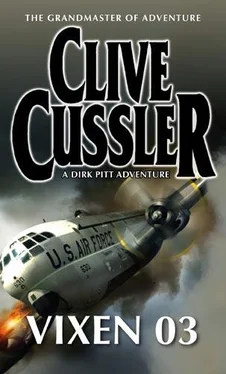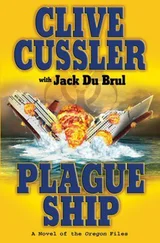For nearly a minute no one in the room spoke, each man unwilling to air the unthinkable consequences to the general's last proposal. Finally, as he knew he must, the President took the initiative.
"It seems to me a small neutron bomb would be a more practical out."
"Radioactivity alone won't kill the QD agent," said Jarvis.
"Also," Kemper injected, "I doubt if the lethal rays could penetrate the turret. They're nearly airtight when buttoned up."
The President looked at Higgins. "I must assume your people have weighed the terrible possibilities."
Higgins solemnly nodded. "It comes down to the age-old choice of sacrificing a few to save many."
"What do you call a few?"
"Fifty to seventy-five thousand dead. Perhaps twice that number injured. The small communities closest to the Iowa and the congested sector of Alexandria would be the hardest hit. Washington proper would receive minor damage."
"How soon before the Marines can go in. asked the President.
"They are boarding helicopters at the staging area this very minute," answered General Guilford, the Marine commandant. "And the SEALs are already on their way downriver in a Coast Guard patrol boat."
"Three combat units of ten men each," added Kemper.
A muted buzzer sounded on the phone beside General Higgins's chair. Kemper leaned over and answered it, listened, and replaced the receiver. He looked up at Higgins, who had remained standing by the viewing screen.
"Communications teams have set up cameras on the southern bluffs above the Iowa," he said. "They'll be transmitting pictures in a few seconds."
Almost before Kemper had finished speaking, the aerial image from the satellite cameras faded into blackness and was replaced by a shot of the Iowa that filled the screen with the ship's superstructure.
The President slowly poured himself a cup of coffee but did not drink it. He stared at the Iowa, his mind churning in search of a decision that only he could make. At last he sighed and addressed himself to General Higgins.
"We go with the SEALs and Marines. If they fail, whistle up the Specter jets and order your forces on shore to open fire with everything they've got."
"And the nuclear strike?" asked Higgins.
The President shook his head. "I cannot carry the burden of ordering mass murders of my own countrymen, regardless of the circumstances."
"We have another half hour before sunrise," said Kemper softly. "Captain Fawkes must have daylight to sight his guns. All radar-operated and automatic-fire control systems were removed from the Iowa before she was decommissioned. He cannot possess any degree of accuracy unless he has a spotter in or near the target area who can report the range and accuracy of the Iowa's fire by radio."
"Could be the spotter is sitting on a rooftop across the street," the President said, sipping at the coffee.
"I wouldn't be surprised," replied Kemper. "However, he won't be on the air for long. We have computerized triangulation monitors set up that can pinpoint his location within seconds."
The President sighed. "Then that about covers it for the moment, gentlemen."
"One more prospect, Mr. President, that I left for last," said Higgins.
"Shoot."
"The Quick Death projectiles. Should we capture them intact, I suggest they be analyzed by Defense Department laboratories — "
"They must be destroyed!" Jarvis cut in. "No weapon that ghastly is worth saving."
"I fear a more immediate problem has just cropped up," said Timothy March.
Every eye whipped back to the viewer at the sound of March's voice. Kemper swiftly snatched the phone and shouted into it. "Pull back your lens to the rear and above the Iowa's stern!"
Unseen hands dutifully did as they were told and the battleship's outline grew smaller as the camera increased the image area. A set of aircraft-navigation lights approaching upriver immediately gripped everyone's attention.
"What do you make of it?" demanded the President.
"A helicopter," Higgins replied angrily. "Some damned civilian must have gotten curious and taken it into his head to buzz the ship."
The men left their chairs and clustered around the screen — ' watching helplessly as the intruding craft beat its way toward the grounded battleship. The observers tensed, their eyes betraying helpless frustration.
"If Fawkes panics and opens fire before our forces are in position," said Kemper tonelessly, "a lot of people are going to get hurt."
The Iowa lay dead in the middle of the Potomac, her engines quiet, the telegraph turned to "all stop." Fawkes looked about him with guarded optimism. The crew was unlike any he'd ever commanded. Several of its members looked to be mere boys, and all were dressed in the camouflage jungle uniforms popularized by the AAR. And, except for the efficient manner in which they carried out their assigned duties, there was nothing about them that remotely suggested South African naval personnel.
Charles Shaba's job as chief engineer was terminated by the idle engines, and according to his orders, he now became the gunnery officer. When he climbed to the bridge, he found Fawkes leaning over a small radio set. He threw a smart salute.
"Pardon me, Cap'n. but can we talk?"
Fawkes turned around and placed a loglike arm on Shaba's shoulder. "What's on your mind," he said, smiling.
Pleased to catch the captain in a good mood, Shaba stood at attention and shot the question that was burning in the minds of the crew. "Sir, where in hell are we?"
"The Aberdeen proving grounds. Are you familiar with it, lad?"
"No, sir."
"It's a sprawling piece of land where the Americans test their weapons."
"I thought… that is, the men thought we were going to sea."
Fawkes looked out the window. "No, lad, the Yanks have kindly allowed us to hold gunnery practice on their target grounds."
"But how do we get out of here?" Shaba asked. "The ship is stuck on the bottom."
Fawkes gave him a fatherly expression. "Don't fret. We'll float her off at high tide as easy as you please. You'll see."
Shaba looked noticeably relieved. "The men will be glad to hear that, Cap'n."
"Good, lad." Fawkes patted him on the back. "Now get back to your station and see to the loading of the guns."
Shaba saluted and left. Fawkes watched the young black man fade into the darkness beyond the passageway, and for the first time he felt a great wave of sorrow for what he was about to do.
His reverie was diverted by the sound of an aircraft. He looked into the brightening sky and saw the blinking multi-colored lights of a helicopter flying upriver from the east. He grabbed a pair of night glasses and aimed them at the craft as it passed overhead. The letters NUMA were vaguely distinguishable through the lenses.
National Underwater and Marine Agency, Fawkes translated silently. No danger there. Probably returning to the Capital from some oceanographic expedition. He nodded at his reflection in the glass, a feeling of security growing within him.
He replaced the binoculars on the bridge counter and turned his attention once again to the radio. He held the headset to one ear and pressed the microphone button.
"Black Angus One calling Black Angus Two. Over."
A slurred, unmistakably Southern drawl answered almost immediately. "Hey man, we don't need all that coded jive. You're comin'in cool as a White Christmas."
"I'd appreciate economy of speech," snapped Fawkes.
"As long as the bread I signed for is good, you're the boss, boss."
"Ready, target range?"
"Yeah, movin' into position now."
"Good." Fawkes glanced at his watch. "Five minutes and ten seconds till Hogmanay."
"Hog… what?"
"Scots for a smashing New Year's Eve."
Fawkes clicked off the mike and noted thankfully that the NUMA helicopter had continued on its leisurely course toward Washington and disappeared beyond the bluffs upriver.
Читать дальше












